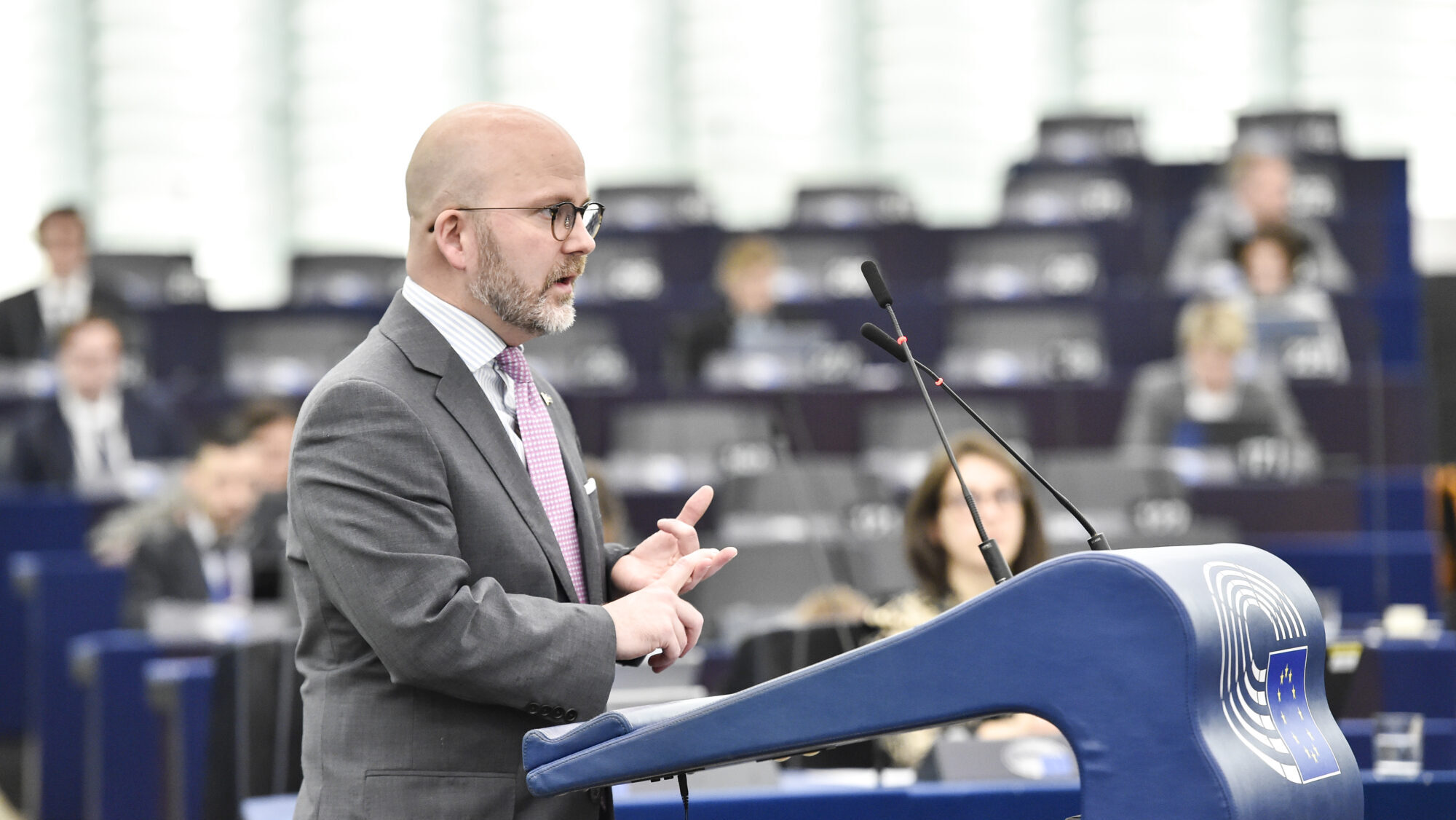
Sweden Democrat MEP Charlie Weimers.
Photo: Eric VIDAL © European Union 2024 – Source : EP
Arguing that the EU’s recently adopted flagship migration management policy (the Asylum and Migration Pact) does next to nothing to address the challenge of illegal migration and to protect the bloc’s external borders, the national conservative Sweden Democrats (SD) have unveiled a complimentary package that they dubbed “European Deportation Pact.”
The proposed reform package is intended to create EU-wide instruments to externalize the asylum and deportation procedures to third countries (like the Italian-Albanian agreement); force countries of origin to accept back their citizens or face sanctions; and implement a version of the so-called ‘Australian model,’ denying EU residence permit for anyone who’s been caught attempting to enter illegally.
Nytt SD-förslag: Europeisk utvisningspakt
— Charlie Weimers MEP 🇸🇪 (@weimers) June 3, 2024
Vi föreslår:
1. Rwanda-modellen: Flytta asylprocessen utanför EU
2. Att EU använder varje förhandling om bistånds-, handels- och visumavtal för att tvinga länder att ta tillbaka sina egna medborgare.
3. Att EU-länderna sätter… pic.twitter.com/XjIr1YrQII
In their article, published in the Swedish daily Dagens Nyheter on Sunday, June 2nd, party leader Jimmie Åkesson and the Sweden Democrats’ lead candidate for the European Parliament, MEP Charlie Weimers, break down some sobering statistics to show that the EU lacks the appropriate tools both to prevent illegal entries and to carry out deportations effectively.
According to Eurostat, authorities identified 1.2 million illegal residents in the EU in 2023. 460,000 of them were ordered to leave, but only around 80,000 did so. The only time you see a significant drop in the number of illegals is when a country grants them mass naturalization—which is a major pull factor, the two lawmakers noted.
“When people who have entered illegally are rewarded with a residence permit, even more people are attracted to try their luck on the Mediterranean,” Åkesson and Weimers wrote.
Therefore, the Sweden Democrats welcome the recent Czech-Danish initiative—backed by 15 member states, a majority in the Council—to create a framework to outsource asylum procedures akin to Italy’s bilateral agreement with Albania, but also propose further measures addressing every dimension of the problem.
The Czech-Danish initiative on externalization—also referred to as Europe’s “Rwanda solution”—is merely the first on Åkesson and Weimers’ 4-point action plan. The authors make it clear that not only do the initial asylum screenings need to be conducted in third-country facilities, but people with deportation orders must also wait there until they leave for their home countries.
The second point is about Brussels putting down its foot when negotiating with countries of origin, which often refuse to accept back their citizens who need to be deported for crossing into Europe illegally. For instance, SD recommends deducting €20,000 from the bilateral aid for every person the country would reject (the same amount EU countries will need to pay for refusing to accept refugees under the Migration Pact); or, if a country is deliberately delaying returns procedures, the EU could delay visa applications in turn.
The third point on the list is setting concrete goals “to significantly increase” the proportion of migrants actually returned relative to those issued deportation orders, as EU law would require. A joint coordination center for deportations could simplify and speed up things, for example, which could even pool deportees from different EU member states on the same plane if they share a destination.
Lastly, the most important element of the proposed new pact is the ‘Australian model,’ a “zero tolerance policy” toward illegal border crossing attempts. The policy that Canberra implemented years ago—with remarkably good results—entails that anyone caught attempting to enter illegally will be denied the possibility of ever obtaining a residence permit even legally. Implementing the same in Europe would serve as a harsh but necessary deterrent against illegal migration.
The article also mentions a few extra measures beyond these four points—such as cutting red tape and making deportation orders automatic at the final rejection of an asylum application—adding that it’s all just a question of political will in Brussels and the capitals.
This far, Ursula von der Leyen’s European Commission and the Parliament’s leftist majority have blocked every similar initiative. But since the Council is already demanding more to be done to fix the asylum system, it’s only a matter of time before the other two institutions are forced to listen.
“If the European Parliament’s right-wing parties gain greater influence after the June 9th elections,” Åkesson and Weimers wrote, “the Sweden Democrats will push for the Deportation Pact.”
